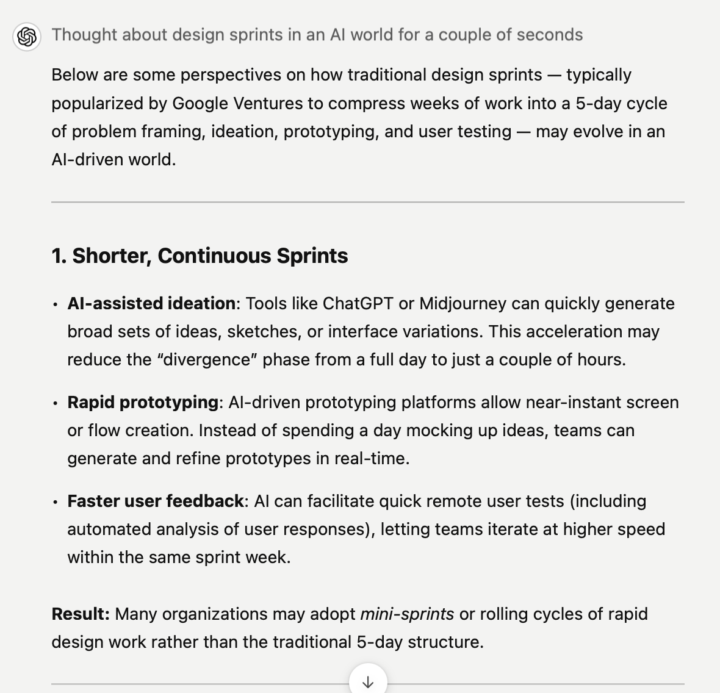Activity
Mon
Wed
Fri
Sun
Mar
Apr
May
Jun
Jul
Aug
Sep
Oct
Nov
Dec
Jan
Feb
What is this?
Less
More
Memberships
Design Sprint Masters
281 members • Free
8 contributions to Design Sprint Masters
I asked ChatGPT: “What’s the future of design sprints in an AI-powered world?
The answer? Check out the screenshots attached. But here’s how I see it: 1- Certain sprint activities—like ideation, prototyping, or user research—may be fully handled by AI. 2. AI will suggest endless solutions, but the real challenge is for teams to interpret these ideas and decide on the best path forward - so critical thinking and really understanding the root cause of problems will be imperative. 3. Roles such as “AI Sprint Facilitator” could emerge, yes - but I believe a better collaboration between a "people dynamics" facilitator and a specialized AI scientist or coach will be more feasible and effective. 4. The raise of mini-sprints. Yes, but they will be done in silos, by designers collaborating with AI agents. No more sprint teams. What are your thoughts on this? How do you see the future?

1 like • Jan '25
@Dana Vetan Let's ask ChatGPT what it thinks 😁. I agree with you on all points. 1) We will need a conscious effort to overcome tendency to be lazy or unambitious, but it is all down to incentives that are in place to motivate us, and we all respond to them differently 2) It is important I think to consider not just the mechanics of doing design sprints (a set of steps with timings and outcomes), but also the cultural dimension, which is specific to the context of the company and country and the sector (private, public). Perhaps, we have under stressed in the past the rules of engagement of people in design sprints and the impact of using one voice of the sponsor to decide not just what solution to build but how to run the sprint 3) I think the bias comes from data, the data comes from people, and the people live in the conditions of pervasive and sometimes invisible inequality. So, AI can never stop being biased. Can we? 4) Yes, I meant empathy to the users, to each other, to the rest of the world. I wonder what the world without empathy in it would look like and could it actually exist? Getting all philosophical because of the good and thought-provoking questions you are asking. 5) Does AI ask questions? Or is it a human trait? Curiosity?
0 likes • Jan '25
@Dana Vetan No, thank you. We need to continue asking these questions. I am also a fan of sci-fi, mostly books on dystopian societies. Think about "1984" or is it "We" in which novels are produced by machines? And now generative AI can write books. Strange to think that I grew up in a world without computers, mobile phones, the Internet. And now a new technology is becoming pervasive and visible with so much promise and associated unintended consequences. Can we do better with it adoption? Can we benefit more than lose out? Don't know. Which is why we need to stay curious...
Team presentation dynamic
Hi! Next week I will start working with a company, facilitating OKR. They are a group of 30 people (managers and middle managers) and I would like to do some activity for us to get to know each other. What dou you recommend? Thank you! 💛
1 like • Feb '23
Hi Francisco, it is difficult to advise with certainty, when not knowing enough. So I just wanted to share an interesting source of activities I found on this website today: Hyper Island Toolbox Check it out. Perhaps, something will jump at you as appropriate for your challenge and best of luck.
🕵️♀️ What's the shortest Design Sprint workshop you have ever facilitated?
At Design Sprint Academy, our shortest sprint is a 3-day sprint designed specifically for hackathon events. By reducing the prototyping phase to 4 hours and limiting user interviews to only 2, we're able to effectively compress Day 3 and Day 4 into one intense day. I'm curious, what's been your experience with short design sprint workshops?
3 likes • Feb '23
I have only had 1 design sprint so far. It lasted 3 days without testing. The preparation for it was long and careful. The work after, took a lot of time and effort too. Participants were very pleased with both: the event itself and the outputs of it. However, before we tried the DS, we faced a lot of opposition from the members of the cross-functional team to the idea. What puzzles me is this paradox: people are prepared to do the daily grind day in day out in an unstructured way with not much to show for it. At the same time, an offer of a 4-day structured format with a promise of something useful and tangible, combined with incredible bonding and learning experience is resisted. I don't know what is behind it, the answers I got were "we have never tried it this way". Any ideas what explains the contradiction I refer to?
1 like • Feb '23
@Dana Vetan and @Bryan Guzmán Thank you for your responses. I haven't considered these as possible reasons. Next time, I will try my best to address the fears of failure and loss of control, and try to emphasise the opportunities for input which I think in hindsight were limited for the whole team because we couldn't invite everyone to the sprint.
Adjusting to Virtual Reality
I work in the UK public sector. We have a service standard with timescales defined for the pre-Covid life with face-to-face interactions being predominant. We have now moved to the virtual world, mostly. I find it slower when it comes to getting across, building shared understanding. But our timescales have not been adjusted and we still think that, for example, a discovery should be between 4-8 weeks. Has anyone come across or felt that expectations for how long things take should be adjusted somehow?
2 likes • Jan '23
Yes, I think you are right. It all depends on what people want to achieve. The wheels of governments sometimes move slower. Our guidance says : "How you know discovery is finished Your discovery is finished when you’ve decided whether or not you want to move on to alpha. There a couple of factors that play into this decision, including whether: - there’s a viable service you could build that would make it easier for users to do the thing they need to do - it’s cost effective to pursue the problem - this means weighing up how much it’d cost against how much of an improvement you think you could make"
Design Sprints vs. Design Thinking ?
What do you think? Similarities and differences? Do you prefer one or the other? When to use what? Go....
5 likes • Jan '23
An interesting question, John. Feels to me like comparing apples and oranges though ;-). Only yesterday, I watched a video https://youtu.be/MDY8IZX3IXY from Jeff Gothelf - Lean vs Agile vs Design Thinking. One of the things I learned from it: there is an artificial distinction often made between different techniques and approaches. Perhaps more useful for practitioners is to rise above these seeming distinctions and look for common principles, some of which Jeff shares in his engaging and often funny video. I also feel that we have created a language that separates us from people we call "users". I wonder whether anyone thought about the way we could go back to simple everyday language to interact with those for whom we build digital products and services?
1-8 of 8
@inna-dalton-6357
I am a Product Manager at the Department of Health and Social Care, UK. My job focuses on improving National Health Service, using digital technology.
Active 361d ago
Joined Jan 24, 2023
Powered by




